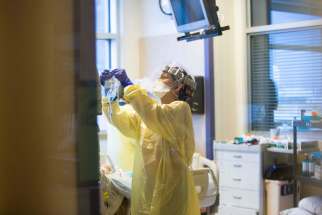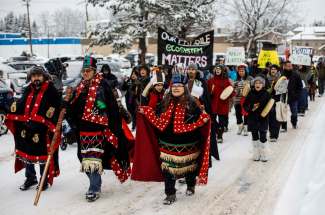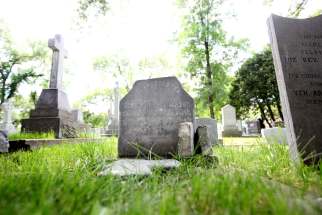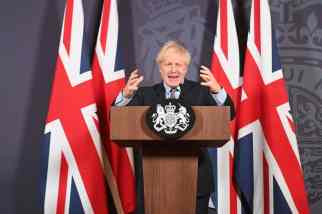Health-care workers sacrifice holidays to keep Christmas staffing stable
Read this article for free:
or
Already have an account? Log in here »
To continue reading, please subscribe:
Monthly Digital Subscription
$1 per week for 24 weeks*
- Enjoy unlimited reading on winnipegfreepress.com
- Read the E-Edition, our digital replica newspaper
- Access News Break, our award-winning app
- Play interactive puzzles
*Billed as $4 plus GST every four weeks. Offer only available to new and qualified returning subscribers. Cancel any time.
Read unlimited articles for free today:
or
Already have an account? Log in here »
Hey there, time traveller!
This article was published 29/12/2020 (1494 days ago), so information in it may no longer be current.
After months of working flat out to care for patients during the pandemic, and sometimes slogging through double shifts, health-care workers were asked to sacrifice yet again by scrapping their days off during the holidays.
Thousands of health-care workers employed by Shared Health and the Winnipeg Regional Health Authority were asked to voluntarily give up their booked time off in late December and January in exchange for vacation pay, according to memos dated Dec. 17. The vacation payout offer is a one-time deal to meet staffing demands during the COVID-19 pandemic, a spokesperson for Shared Health confirmed. It’s expected to run until the end of January and doesn’t apply to doctors.
The request was put forward “as one part of a multi-pronged health system strategy to ensure appropriate staffing levels to support the unprecedented demands of COVID-19,” Shared Health’s statement said.
It means an undisclosed number of health-care workers went without their scheduled holiday break to care for patients and keep hospitals and COVID-19 units running.
COVID-19 – Shared Health – Voluntary vacation payout
Shared Health wouldn’t specify Tuesday how many employees were asked to give up their time off, or how many of them agreed to it.
The request to employees acknowledged workers are “stretched in many ways,” and expressed gratitude for their work, while asking them to forego their break. The memo was issued less than a week before COVID-19 vaccination clinics in the province, currently only open to select front-line health-care workers, were paused for five days over Christmas.
“This virus does not take days off or recognize holidays and while it continues to place extraordinary demands on our health system, we know you will be there. We recognize the sacrifices you have made over the past ten months,” the memo stated.
On Tuesday, nearly two weeks later, hospital staffing levels were considered stable — even though sick time continues to pile up amid the “unprecedented demand” of COVID-19, health officials said.
COVID-19 – WRHA – Voluntary vacation payout
Health-care unions have repeatedly said staffing shortages existed before the pandemic and have worsened because of it. They say taking a holiday break away from front-line workers makes them more susceptible to burnout.
Debbie Boissonneault, president of CUPE Local 204, said in addition to being asked to give up vacation days, some of her members haven’t been able to get time-off requests approved after working statutory holidays because of staff shortages. She said she hopes health-care workers get recognition for all their sacrifices even after the pandemic ends.
“They stepped up when they needed to step up, and I hope that’s remembered.”
In a statement, the Manitoba Nurses’ Union said it is looking into “isolated” cases of cancelled vacation time.
“They have been there for patients, caring for those in need, and assisting patients and families through numerous tragic losses due to COVID. These caregivers also need their own downtime to replenish and recuperate.” – Manitoba Nurses’ Union
“While some employers have requested nurses consider voluntarily cancelling their vacation, and some nurses have agreed to do so, at this point we have only heard of a few isolated incidents where the employer has sought to mandate and unilaterally cancel nurses’ approved holiday time. We are continuing to gather details, but in those cases, MNU intends to vigorously challenge such action. They ought not to be expected to carry this additional burden brought on by employers’ longstanding failure to staff appropriately,” the union’s statement said.
“They have been there for patients, caring for those in need, and assisting patients and families through numerous tragic losses due to COVID. These caregivers also need their own downtime to replenish and recuperate.”
Meanwhile, health-care workers are using up sick time at much higher rates than usual during the pandemic, likely because they’ve tested positive for the virus or are a close contact of someone who has.
In the past two weeks, 107,000 working hours were lost because of sick time in Winnipeg health facilities, Shared Health chief nursing officer Lanette Siragusa said Tuesday.
Compared with the five-year average amount of sick time used during the same time period in December, it represents an additional 1,400 eight-hour shifts per week lost to sick time. Still, the most recent data marked an improvement from the previous pay period, which had nearly 6,000 more sick time hours, Siragusa said.
“We can’t always say that it’s because of COVID, however, these high levels of sick time being used now, when we really don’t have influenza circulating, would strongly suggest that it’s tied to staff.” – Shared Health chief nursing officer Lanette Siragusa
“We can’t always say that it’s because of COVID, however, these high levels of sick time being used now, when we really don’t have influenza circulating, would strongly suggest that it’s tied to staff who (have) either tested positive for COVID or have been identified as contacts of a case and need to isolate,” she said, adding they’re trying to make it easier for staff to get tested.
When asked about current hospital staffing levels, Siragusa said they’re stable. She said operational teams worked hard prior to and during the holidays to make sure enough staff members were available, particularly in critical-care units and personal care homes.
“It has been stable, the nurses have stepped up, and been working hard, as well as all the other support staff around them. So care has carried on, obviously, and we’re in a decent space now and we’re hoping that this continues.”
Since the pandemic began, 1,485 health-care workers in Manitoba have tested positive for COVID-19. Of those, 870 got it because they were a close contact of a positive case, provincial data show.
katie.may@freepress.mb.ca
Twitter: @thatkatiemay

Katie May
Reporter
Katie May is a general-assignment reporter for the Free Press.
Our newsroom depends on a growing audience of readers to power our journalism. If you are not a paid reader, please consider becoming a subscriber.
Our newsroom depends on its audience of readers to power our journalism. Thank you for your support.







